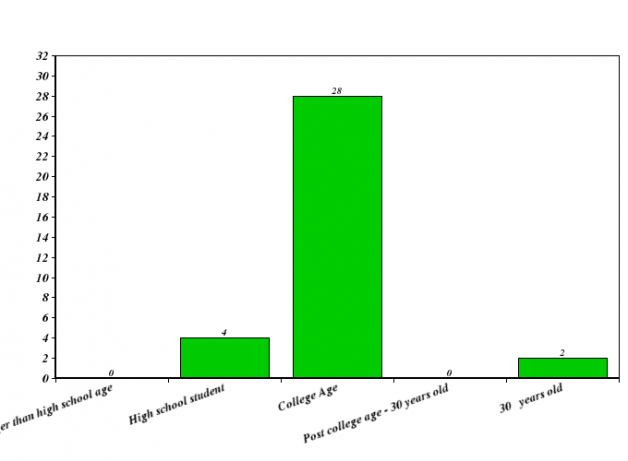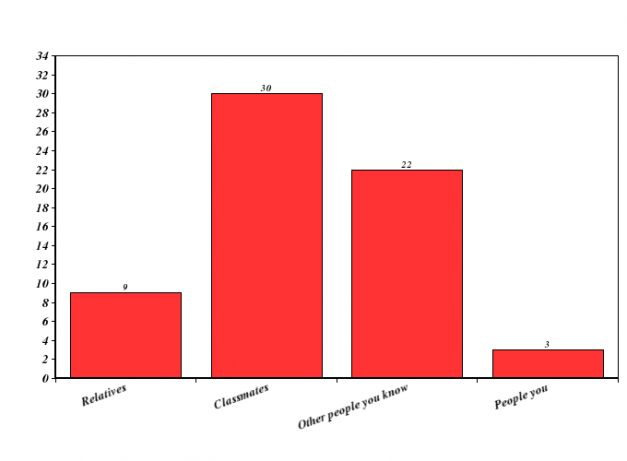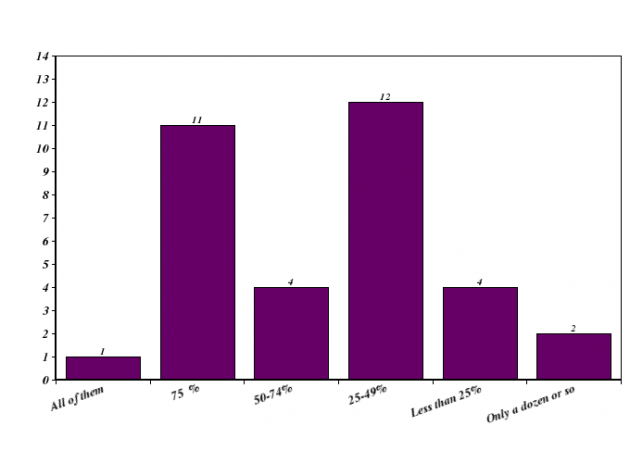My Survey
Using surveymonkey.com, I asked people to take my survey by posting the link in my Facebook status. A total of 34 responders took it. Although the questions were not targeted specifically at Facebook, all of the responders obviously use it. Although which social networking sites participants use is not among the questions, I am aware that the majority of them confine their social networking to mainly Facebook, and most are just typical college students. Perhaps more insightful than the statistics were some of the free response answers I received.
1. How much time do you spend on social networking sites in an average week?
1. How much time do you spend on social networking sites in an average week?
The majority of responders are clearly very active on social networking sites, with only a few spending less than 2 hours per week and the majority spending more than 5.
2. Which of the following describes you?
2. Which of the following describes you?
Although no one younger than high age nor post college age - 30 years old, there are a few high school students and those aged 30+ to supplement the opinions of the majority college students. Unfortunately, there is no way of determining a breakdown of the answers based on responses to this question.
3. A significant portion of your social networking connections are: (more than one answer choice possible)
3. A significant portion of your social networking connections are: (more than one answer choice possible)
Most users are connected online mainly with their classmates and other people they know. Only a few have a significant amount of online friends whom they do not know, indicating their purpose for using the site is not for meeting new people but to stay in touch with classmates and people they already know.
4. Outside of the social network context, how many of your connections would you consider friends?
4. Outside of the social network context, how many of your connections would you consider friends?
While sites like Facebook and Myspace term your connections as friends, only one person actually considers all of these people as his friends. The majority of people in fact consider less than half of these online friends as friends, so it seems a 'friend count' isn't actually indicative of the number of friends you feel you have. As some o the free responses say, many consider friendship to be developed and sustained outside of the social networking context.
5. Do you feel that through any online social networks you belong to a community?
5. Do you feel that through any online social networks you belong to a community?
This question determines users' definition of community. Half believe that their online lives and connections makes them members of an online community, while half believe, as one of the responses claimed, that it is just "an extension of real life" and not an independent community.
6. Do you feel that if you were to not participate in social networking you would be missing out?
6. Do you feel that if you were to not participate in social networking you would be missing out?
While only half claimed they were part of a community, two-thirds believe they would be missing out on something by not participating in online networking. Perhaps those who answered no - yes to the last two questions feel they would be missing out on aspects of their offline community. Overall, most responders believe that being connected online adds something to their lives that they would miss and that they would feel let out of either their online community, if they believe they belong to one, or the "extension of real life" that is online.
7. Of how many of your connections would you feel comfortable asking a small favor, such as borrowing a movie or asking for a ride home?
7. Of how many of your connections would you feel comfortable asking a small favor, such as borrowing a movie or asking for a ride home?
While it might seem logical that these answers would correlate to the number percentage of people you would consider friends (Question 4), it seems that these definitions don't coincide. While we cannot tell how each person's answer varied, it appears that overall participants consider more people friends than they do close enough to ask a favor. This shows that someone you consider 'a friend' may not even be intimate enough to ask to borrow a movie.
8. For how many of your connections would you volunteer to do a small favor?
8. For how many of your connections would you volunteer to do a small favor?
Again, you might expect these answers to match up with the question above or even Question 4, but they do not. It seems people are either more charitable - being more willing to give than to ask - or possibly they consider people friends but think that those friends may not consider them as friends, as responders seem more willing to give friendly favors than to ask for them.
9. You have had a spoken conversation (not just a brief exchange of pleasantries) either in person or over the phone with how many of your connections?
9. You have had a spoken conversation (not just a brief exchange of pleasantries) either in person or over the phone with how many of your connections?
Most responders have shared a conversation with the majority of their connections. Here it is interesting to consider the outliers. A few people have had conversations with all of their cnnections, indicating that they probably only keep up with people who they really know, and do not seek out new friendships online. Only a few have had spoken conversations with less than half, although here it is unknown if they have never really connected with the other half or only communicate nonverbally online.
10. Free Response: How do you think social networking has influenced the way you think about friendship, community, and yourself?
-It's made me think that most other people define 'friend' more broadly than I do. It also made me think of friendhip not only as talking to a person but also just following what's going on in their life. I suppose it can create more indirect friendships.
-believe that social networking has given people a different view on friendship. For some, it is how many people can they have on their friends list, even if they do not know half the people on it. For others, it is actually just having those one considers their actual friends or people they actually know. Friends and people are now easier to talk to, but it means that long conversations or actually talking to people is replaced by quick comments and short thoughts.
-I think social networking is a great way to stay in contact with friends who you don't necessarily see everyday.
-I think that Facebook has helped to connect me to my social niche at college, because through it we learn about parties and events. Also facebook helped me get to know my freshman roommate before we even met.
-It's an awesome tool to plan events, share things, and get in contact with old friends. However, it should never and could never replace face-to-face contact and real relationships.
-I found near the end of high school that I was picking up "friendships" on facebook like flies, so my sort of litmus test now is that I feel comfortable adding someone on facebook when I a) exchange numbers or b) would not feel awkward hugging them goodbye.
-Although I feel more connected to the people that I meet that live far away from me, I do not feel that social networking has created any deep relationships for me. I feel more up to date with people's lives, but actual deep relationships come from personal contact with people.
-I think in some ways it has enhanced preexisting friendships by providing another channel of communication, but it doesn't necessarily do anything to form good new friendships. As a result, I think it sometimes cheapens friendships by making it very easy to communicate.
-Social networking for me is just more of another way to communicate on top of the phone, and it's easier than e-mail so that's all it really is for me. It doesn't effect how I see friends or even how much I talk to my friends.
-I have gained much deeper friendships with people that I met briefly and might have never become true friends with by continuning to contact them through facebook chat, status comments, and wall posts, etc. Also facebook allows me to stay in contact with people no matter how far away they live.
-I think social networking make people have weak social skills.
-It is to some degree strange and to many other degrees thrilling that people whom I have never met, and never would have otherwise known, I now count among my friends. These are primarily through Twitter and YouTube; facebook is merely an extension of real life (and in some cases connexions on YouTube). Wonderful, nice, funny and intelligent scarcely begin the list of poistive things many people are. And knowing about them means in some way knowing them, and thus caring for them, supporting them in their struggles, rejoicing in their triumphs. And that's what I find coolest. Social networking enhances human compassion. That is why it will never go away, and why it never should go away.
-Basically it's helped me connect with people I normally wouldn't be able to. I'm in a sorority and we go to visit other chapters outside of my school I meet new people. Then when I get home I have new friend requests from the people I met, and look for more of them on the pages of the people I just met. Without the social networking I wouldn't be able to keep in touch with my (sorority) sisters that live elsewhere.
-It makes it easy to keep in touch with friends who move away or go to a different college. It is easier to be a part of their lives even though they are far away.
-This has linked us to a much larger community than just face-to-face communications do. It broadens your circle of friends that you interact with, even if not in person.
Most participants agree that social networking supplements communication with friends and acquaintances. In this way it allows a new form of contact, making distance irrelevant and communication a click away. For most it does not replace other methods of communication, but for those who seek out friendships and connections, there are social networking sites like Twitter, Youtube, and blogging sites that allow new friendships to form. It seems that most college students, however, are more focused on their physical lives and friendships than with cultivating online ones and joining online communities.









